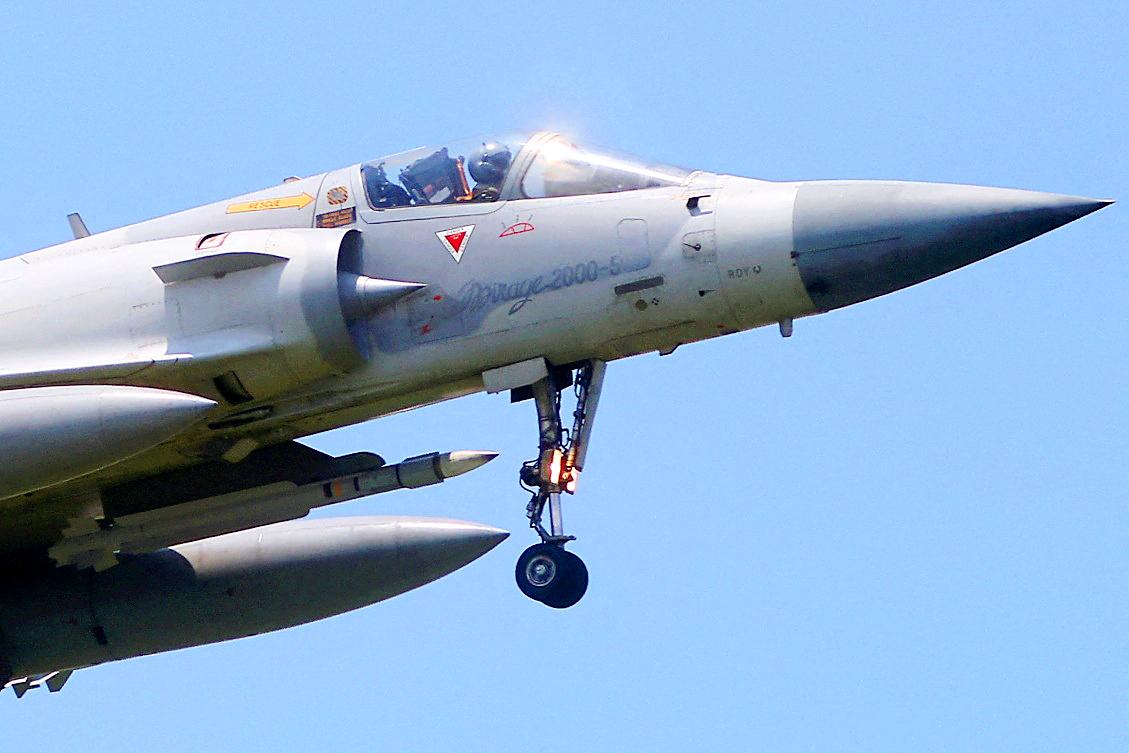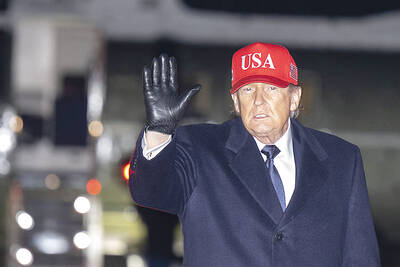If any war were to break out between the US and China, one trigger might be the increasingly frequent fighter jet encounters near Taiwan.
Almost every day, Taiwanese fighter pilots hop in their US-made F-16s to intercept Chinese warplanes screaming past their territory. The encounters probe the nation’s defenses and force the pilots on both sides to avoid mistakes that could lead to a crisis that spins out of control.
“I didn’t know whether they would fire at me,” said retired colonel Mountain Wang, recounting a tense five-minute confrontation he had with Chinese People’s Liberation Army (PLA) jets more than a decade ago. “You have to be highly alert and not lead to any accident with unintended consequences.”

Photo: Ann Wang, Reuters
The risk is even higher now and not just because China is sending more jets with more experienced pilots ever closer to Taiwan proper.
On Wednesday, 27 Chinese military aircraft flew into Taiwan’s air defense identification zone, of which 22 crossed the median line of the Taiwan Strait, the Ministry of National Defense said.
The incursions took place a day before the launch of China’s live-fire military drills in six maritime areas near Taiwan, widely seen as retaliation for a visit by US House of Representatives Speaker Nancy Pelosi to Taiwan earlier last week.
The PLA fired 11 missiles into waters near Taiwan on Thursday, the ministry said, as part of China’s most provocative exercises in decades.
However, a longer-term problem for Taiwan’s military is its dire shortage of pilots. While Taipei is protected by a relatively large and modern fleet of fighter jets, the nation could need as many as 50 years at the current rate to train enough pilots to fill the cockpits of the jets they expect to get by the middle of this decade.
Taiwan might not have that kind of time.
US military commanders estimate Chinese President Xi Jinping (習近平) might have the capability to take action across the Taiwan Strait in as soon as five years, and the daily incursions are wearing down Taiwan’s pilots and the jets they fly.
The shortage illustrates the limits of Taipei’s reliance on purchases of US military hardware to deter the threat of invasion by Beijing. Taiwan would need to add at least 100 more pilots by 2026 to operate the 66 more advanced Lockheed Martin F-16Vs that President Tsai Ing-wen (蔡英文) agreed to buy two years ago.
ONLY 21 NEW PILOTS
The air force only netted 21 new F-16 pilots from 2011 to 2019, according to data compiled by the Taiwan People’s Party (TPP).
“Taiwan has put a lot of emphasis on military preparation,” TPP Legislator Jang Chyi-lu (張其祿) said. “A bigger problem, though, is who can fly the planes?”
Ukraine’s own months-long struggle to turn back Russia’s invasion has highlighted the challenge facing Taiwan’s strategic planners. Although Kyiv has received a huge influx of Western-made military hardware, it has also benefited from having a large reserve of relatively well-trained military personnel.
Taiwan’s effort to attract and train more pilots has been thwarted by a series of factors, from the nation’s declining birthrate to several high-profile crashes. About 80 percent of university students in Taiwan have myopia, due to long classroom hours and high-levels of screen time on electronic devices.
Taiwanese authorities say Ukraine’s success in denying air superiority to a much larger invading power has helped recruiting.
In March, 70 percent of 1,076 people polled by the Taiwan International Strategic Study Society said they were willing to go to war to defend their nation from Beijing’s attack, up from 40 percent in December last year.
Chiang Ming-chun, 18, said he was determined to be an air force pilot despite concerns about the safety risks and increased tensions with China.
“They asked me why not pick army or navy, why does it have to be air force? I just told my parents it is my ambition,” said Chiang, who would be a freshman at the Air Force Academy this year. “If I don’t do it now, I’ll regret why I didn’t chase my dream.”
That renewed determination to sign up was evident last month at the Seventh Flight Training Wing on the Chihhang Air Base in Taitung. The base, located on the Pacific coast, is to house the new F-16Vs, as well as 33 locally developed Yung Ying (勇鷹, “Brave Eagle”) Advanced Jet Trainers by 2024.
‘TOP GUN’ BOOST
Matt Shen, an instructor at the facility, said the release of Top Gun: Maverick — in which Tom Cruise can be seen sporting a Taiwanese flag patch on his jacket — has also driven new applicant interest.
“We think recruiting should be easier in the next two years because Top Gun is so popular,” Shen said, adding: “Many young men dream of flying.”
More than half of the 70 to 80 trainees annually at the center are now being sent to the F-16 wing, Shen said, compared with one-third a few years ago, due to an effort to deal with China’s increased military activity.
PLA aircraft made about 960 forays into Taiwan’s air defense identification zone last year, compared with about 380 in 2020, ministry data showed.
Such encounters are not just shows of power: Forcing Taiwan to drive away warplanes delays its ability to train new fighter pilots, depleting the nation’s capacity to respond in a real conflict.
The air force acknowledged in a statement that the pressure from China was “severe,” but said its capacity to respond had “never slackened.”
“The air force is actively increasing recruits, raising the distribution ratio of pilots to F-16 fleet and enhancing staff’s willingness to stay, and these measures are able to satisfy demands for future pilots,” it said.
LOWER GRADES
Flying schools have begun accepting trainees with lower academic grades to ensure they get more candidates who meet both the physical fitness and vision requirements. The air force has also made it easier for them to sign up in recent years, relaxing rules requiring 20-20 vision and offering corrective eye surgery to some.
Moreover, the busy schedule prevents experienced pilots from helping train new ones. Taiwan requires 250 hours of flight training before a pilot can fly a fighter jet like the F-16.
The Taiwanese military has also seen four air crashes this year, including a fatal one involving an F-16 in January. In May, an air force trainer jet also crashed, killing its pilot.
Chang Yan-ting (張延廷), a former vice chief commander of the air force, said that “insufficient training” was a contributing factor to such incidents.
“The crashes we have seen in air force in the past few years were just the tip of the iceberg, and the situation is expected to get worse in future,” he said.
Still, Shen said his own son also plans to become an air force pilot.
He is not deterred that his son is signing up despite the growing risk of a close encounter with a Chinese warplane.
“I encourage him to do so,” Shen said. “I’m not worried about death. Who can avoid death if a war breaks out? We are at the front line, and it’s our mission to guard the country.”

Taiwan has received more than US$70 million in royalties as of the end of last year from developing the F-16V jet as countries worldwide purchase or upgrade to this popular model, government and military officials said on Saturday. Taiwan funded the development of the F-16V jet and ended up the sole investor as other countries withdrew from the program. Now the F-16V is increasingly popular and countries must pay Taiwan a percentage in royalties when they purchase new F-16V aircraft or upgrade older F-16 models. The next five years are expected to be the peak for these royalties, with Taiwan potentially earning

STAY IN YOUR LANE: As the US and Israel attack Iran, the ministry has warned China not to overstep by including Taiwanese citizens in its evacuation orders The Ministry of Foreign Affairs (MOFA) yesterday rebuked a statement by China’s embassy in Israel that it would evacuate Taiwanese holders of Chinese travel documents from Israel amid the latter’s escalating conflict with Iran. Tensions have risen across the Middle East in the wake of US and Israeli airstrikes on Iran beginning Saturday. China subsequently issued an evacuation notice for its citizens. In a news release, the Chinese embassy in Israel said holders of “Taiwan compatriot permits (台胞證)” issued to Taiwanese nationals by Chinese authorities for travel to China — could register for evacuation to Egypt. In Taipei, the ministry yesterday said Taiwan

‘LIKE-MINDED PARTNER’: Tako van Popta said it would be inappropriate to delay signing the deal with Taiwan because of China, adding he would promote the issue Canadian senators have stressed Taiwan’s importance for international trade and expressed enthusiasm for ensuring the Taiwan-Canada trade cooperation framework agreement is implemented this year. Representative to Canada Harry Tseng (曾厚仁) in an interview with the Central News Agency (CNA) said he was increasingly uneasy about Ottawa’s delays in signing the agreement, especially as Ottawa has warmed toward Beijing. There are “no negotiations left. Not only [is it] initialed, we have three versions of the text ready: English, French and Mandarin,” Tseng said. “That tells you how close we are to the final signature.” Tseng said that he hoped Canadian Prime Minister Mark Carney

The US’ joint strikes with Israel on Iran dismantled a key pillar of China’s regional strategy, removing an important piece in Beijing’s potential Taiwan Strait scenario, said Zineb Riboua, a senior researcher at the Hudson Institute’s Center for Middle East Peace and Security. In an article titled: “The Iran Question Is All About China,” Riboua said that understanding the Iran issue in the context of China’s “grand strategy” is essential to fully grasp the complexity of the situation. Beijing has spent billions of dollars over the years turning Iran into a “structural strategic asset,” diverting US military resources in the